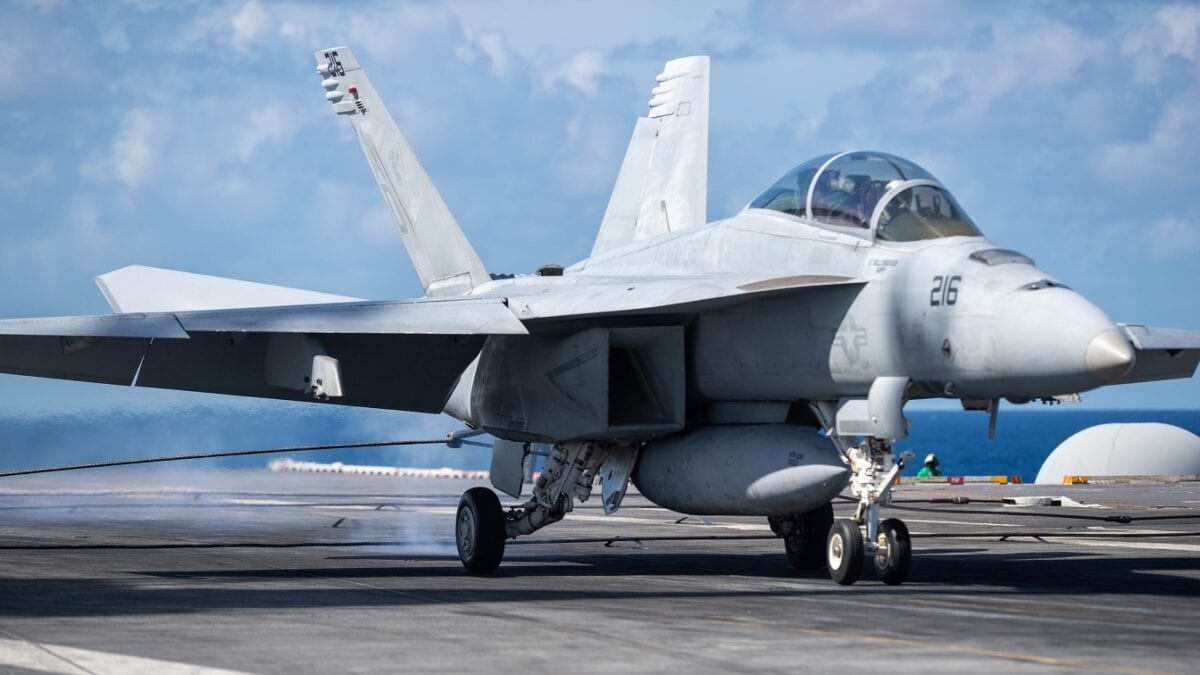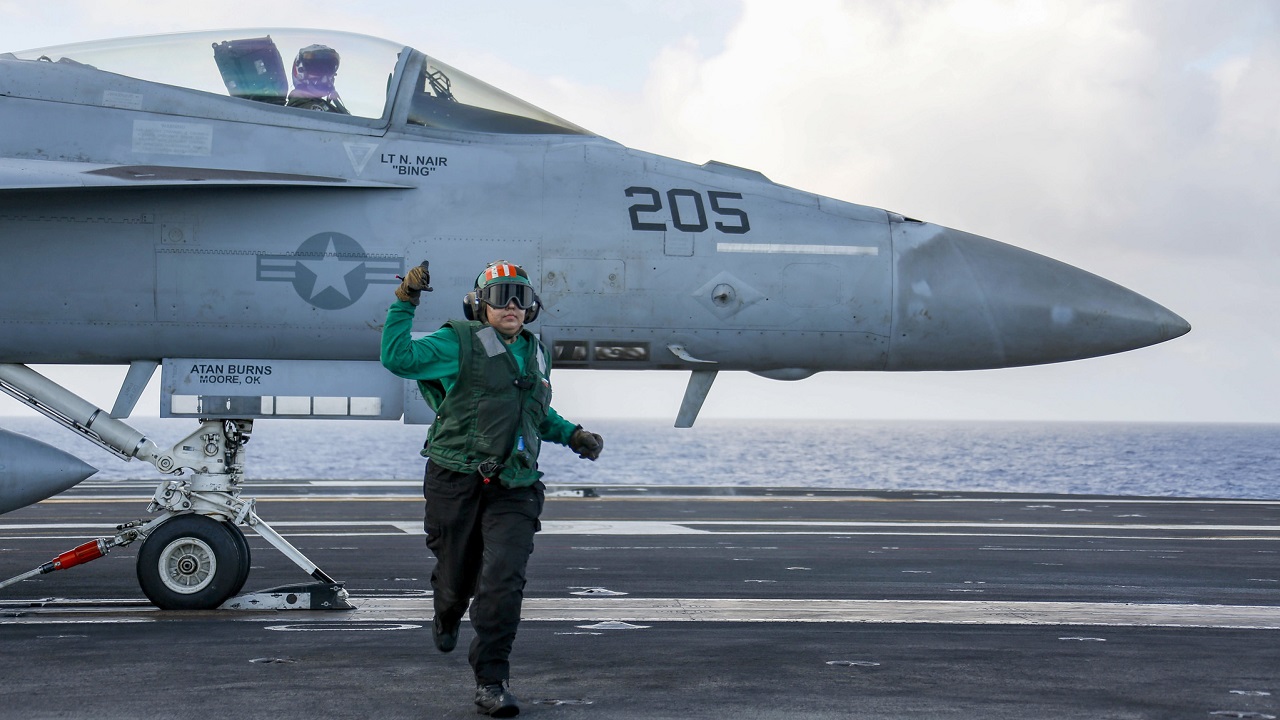I’ve been a ghost around the hallowed halls of the U.S. Naval War College in Newport this sabbatical year. But I did clank and moan my way onto campus late last month to give a talk at the Center for Irregular Warfare and Armed Groups annual symposium. This year’s workshop attendees explored “gray-zone” competition at sea, chiefly in such quarters as the South China Sea.
My bottom line was blaringly obvious—namely, that a contender has to take the field of competition and stay there in order to compete.
That you have to be there to win seems pretty straightforward, doesn’t it? I rather doubt the legendary University of Georgia Bulldogs football team would have defeated Alabama for the national championship last January had the Dawgs only shown up in the first half of the championship game. A contestant has to show up—and stay for the duration of the contest—if it hopes to control the field and win the game.
The brawniest team accomplishes little if it doesn’t compete. And it has to stay the course.
And yet U.S. forces have displayed a disturbing proclivity for violating this simple precept—in irregular warfare and gray-zone competition in particular. They show up and take control of the field, only to move on in search of the next battle or engagement. In the process, they relinquish control to such outmatched foes as the Taliban or North Vietnamese communists. Small wonder victory proves elusive.
The same precept that holds in open combat holds in the shadowy realm of great-power strategic competition. If China fields the world’s largest maritime militia, coast guard, and navy and backs up seagoing forces with shore-based military might, and if its forces are on the scene all the time, it exercises control of the disputed turf. No Southeast Asian navy or coast guard can outmuscle it.
And outsiders? U.S. naval contingents can show up all they like to mount a show of force or freedom-of-navigation cruise. No matter how impressively they comport themselves, though, they cede control to China when they depart the scene—as they typically do after a brief spell. And Chinese forces resume bullying Southeast Asian neighbors when they go, in a bid to make good on China’s unlawful claims to be sovereign over some 80-90 percent of that body of water.
If you forfeit control of something important, don’t be surprised when a rival seizes it. And don’t complain when you see that L inscribed on your won-loss ledger.
So much for the recap. During the Q&A, a commonplace question came up: why do we have to be there? In other words, why does America have to be in theaters off rival great powers’ shores at all? Now, the question constitutes a sleight of hand, shifting a discussion about the hows of gray-zone strategy and operations and making it about the whys. But no matter. Here’s how I replied if I correctly decipher my chicken-scratching from the event:
Military sage Carl von Clausewitz might agree that a contender shouldn’t pursue a competition unless it cares enough to win. He observes that the value a contender attaches to its “political object”—its goal—must determine the “magnitude” and “duration” of the effort it puts into obtaining that goal. In other words, how much it cares about its goal should dictate how much it spends on the goal, and for how long.
If you don’t prize something, don’t spend much on it—or anything at all.
Clausewitz also observes that three elements comprise any society, namely the people, government, and military. The people are usually the wellspring of passion for some warlike endeavor, the military its executor, and the government its rational (restrain your giggles) overseer. If top political leadership can’t align the people, military, and government toward some worthwhile goal, it’s probably best to forego the attempt to grasp it.
But.
Being there is a conscious political and strategic choice, but so is not being there. This is a choice of the utmost moment. Accordingly, top leadership in Washington DC needs to put the stakes in the Indo-Pacific to the American people in the starkest terms possible. The stakes are compelling and should be nonnegotiable. They are worth an effort of substantial magnitude and duration, in Clausewitzian parlance.
Let’s stick to the South China Sea for today, although the same applies to any semi-enclosed seaway coveted by a strong coastal state. In fact, three successive presidential administrations representing both political parties have concurred that freedom of the sea is a goal worth championing—and investing in lavishly. It’s not hard to see why. The basic principle underlying freedom of the sea is that no one owns the sea, with very limited exceptions codified by treaty. This principle comprises the foundation of the international legal order of maritime trade and commerce.
China’s claim to sovereignty over the South China Sea amounts to a claim to state ownership of nautical territory. It is staging a direct assault on the world order over which the United States has presided since 1945, and which has profited all trading societies—including China.
Freedom of the sea is indivisible. It applies throughout the world’s oceans and seas. But if Beijing gets its way, the rules governing what happens in the South China Sea will be made in China—never mind what the UN Convention on the Law of the Sea, the “constitution for the oceans,” says, or what rulings authoritative international tribunals hand down regarding territorial disputes between China and its Southeast Asian neighbors. Freedoms sanctified by treaty will cease to exist—or at most will be indulged at the sufferance of the Chinese Communist Party.
So preserving freedom of the sea is a goal of surpassing importance, yet Southeast Asians have zero chance of preserving it from Big Brother’s avarice. That leaves guarantors from outside the region, the United States foremost among them. That’s why we have to be there—and that’s why Washington must rally the electorate to the cause.
If not America, who?
But again, the problem doesn’t stop with the South China Sea. If the international community shrugs and lets China get away with purloining this maritime space from its neighbors, there is no reason in principle why China can’t do the same in other expanses it craves, notably the Taiwan Strait and East China Sea. Nor is there any reason other malefactors can’t do it in waters they deem theirs—say, Iran in the Persian Gulf or Russia in the Black Sea or Arctic Ocean.
If it lets the South China Sea go, the international community will have consented to the abolition of a time-tested principle—that the sea belongs to no one and everyone—and reestablished the bad old principle that the strong do as they will in world politics while the weak suffer what they must. And the foundation of the maritime legal order will start to crumble.
Let freedom of the sea go, furthermore, and U.S. grand strategy of over a century’s standing will come undone. Since the days of Theodore Roosevelt, Henry Cabot Lodge, and Alfred Thayer Mahan, the United States has premised its grand strategy on securing commercial, diplomatic, and military access to important trading regions, chiefly the rimlands of East Asia and Western Europe. Access is the purpose and prime mover of American strategy.

An F/A-18F Super Hornet, assigned to Strike Fighter Squadron (VFA) 106, catches an arresting gear wire while landing on the flight deck of the aircraft carrier USS John C. Stennis (CVN 74) in the Atlantic Ocean, Nov. 4, 2019. The John C. Stennis is underway conducting routine operations in support of Commander, Naval Air Force Atlantic. (U.S. Navy photo by Mass Communication Specialist 2nd Class Grant G. Grady)
Yet commercial and diplomatic access will stand in peril if powerful coastal states start making offshore waters their own. Nor will the United States be able to interject itself in the rimlands militarily should some domineering power or alliance bid for martial supremacy there, and should local powers—many of them U.S. allies and friends of decades’ standing—prove unable to fend off the would-be hegemon on their own.
After all, U.S. maritime forces won’t be able to get to the rimlands to balance against great-power antagonists if they cede command of offshore waterways. If America is not there for its allies in their time of need—if it betrays them, cutting and running rather than honoring longstanding commitments—fateful consequences are apt to follow. It will have shown that its solemn promises are hollow.
Law, geopolitics, and strategy—that’s why we have to be there.
A 1945 Contributing Editor, Dr. James Holmes holds the J. C. Wylie Chair of Maritime Strategy at the Naval War College and served on the faculty of the University of Georgia School of Public and International Affairs. A former U.S. Navy surface warfare officer, he was the last gunnery officer in history to fire a battleship’s big guns in anger, during the first Gulf War in 1991. He earned the Naval War College Foundation Award in 1994, signifying the top graduate in his class. His books include Red Star over the Pacific, an Atlantic Monthly Best Book of 2010 and a fixture on the Navy Professional Reading List. General James Mattis deems him “troublesome.” The views voiced here are his alone. Holmes also blogs at the Naval Diplomat.

